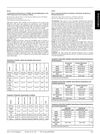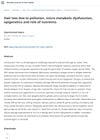 3 citations,
January 2018 in “Biomedical dermatology”
3 citations,
January 2018 in “Biomedical dermatology” Green tea extract helps prevent cell death and supports cell survival in hair cells exposed to a chemotherapy drug.
 3 citations,
August 2017 in “International journal of reproduction, contraception, obstetrics and gynecology”
3 citations,
August 2017 in “International journal of reproduction, contraception, obstetrics and gynecology” People with PCOS have higher levels of PAI-1, which may increase their risk of heart disease and fertility issues.
 3 citations,
February 1976 in “Pediatric Clinics of North America”
3 citations,
February 1976 in “Pediatric Clinics of North America” The conclusion is that effective cancer treatment often requires a combination of therapies, but must be carefully managed due to serious side effects and the risk of immunosuppression.
[object Object]  2 citations,
September 2023 in “Aging”
2 citations,
September 2023 in “Aging” Elastic Net DNA methylation clocks are inaccurate for predicting age and health status; a "noise barometer" may better indicate aging and disease.
 2 citations,
April 2016 in “Medical Hypotheses”
2 citations,
April 2016 in “Medical Hypotheses” Antioxidants might help prevent pressure ulcers, but more research is needed to find effective ones.
 2 citations,
January 2013 in “Elsevier eBooks”
2 citations,
January 2013 in “Elsevier eBooks” The chapter explains the causes of excessive hair growth and masculinization in women and how to measure hormone levels related to these conditions.
1 citations,
January 2018 in “Annals of Medical and Health Sciences Research” People with male pattern baldness are more likely to have metabolic syndrome.

Drinking sweetened tea and poor sleep habits may increase the risk of hair loss in women.

Drinking sweetened tea and poor sleep increase the risk of hair loss in women.

Drinking sweetened tea and poor sleep habits increase the risk of hair loss in women.

Drinking sweetened tea and late bedtimes increase the risk of hair loss in women.

Drinking sweetened tea and late bedtimes increase the risk of hair loss in women.
 November 2024 in “Journal of Translational Internal Medicine”
November 2024 in “Journal of Translational Internal Medicine” Exosomes from stem cells help hair regrowth by activating a specific signaling pathway.
 April 2024 in “bioRxiv (Cold Spring Harbor Laboratory)”
April 2024 in “bioRxiv (Cold Spring Harbor Laboratory)” A gene network led by RSL4 is crucial for early root hair growth in response to cold in Arabidopsis thaliana.
 April 2024 in “Frontiers in cellular and infection microbiology”
April 2024 in “Frontiers in cellular and infection microbiology” Blue light might help treat skin conditions by affecting the skin's bacteria.
 January 2024 in “Journal of the Endocrine Society”
January 2024 in “Journal of the Endocrine Society” The research found that measuring androgens in urine can give extra information about body metabolism and is linked to androgen levels in the blood, especially in young girls.
 December 2023 in “Frontiers in endocrinology”
December 2023 in “Frontiers in endocrinology” Excess androgens may cause PCOS, not just be a symptom.

Lifestyle changes can improve skin health and reduce disease symptoms.
 November 2022 in “CARDIOMETRY”
November 2022 in “CARDIOMETRY” A group has developed therapies that show promise for treating cancer and various other conditions.
 August 2022 in “Revista de la Universidad Industrial de Santander/Salud UIS”
August 2022 in “Revista de la Universidad Industrial de Santander/Salud UIS” Stress-related hair loss was reversed with a special medication.
 May 2022 in “Indian Journal of Animal Research”
May 2022 in “Indian Journal of Animal Research” Melatonin receptor genes likely play an important role in the development of goose feather follicles.
 December 2020 in “bioRxiv (Cold Spring Harbor Laboratory)”
December 2020 in “bioRxiv (Cold Spring Harbor Laboratory)” Stress can cause a type of hair loss in mice lacking the CCHCR1 gene.
 January 2020 in “Journal of Pharmacognosy and Phytochemistry”
January 2020 in “Journal of Pharmacognosy and Phytochemistry” The VCO-based herbal hair tonic is effective, safe for hair loss treatment, and can be mass-produced.
 January 2017 in “Elsevier eBooks”
January 2017 in “Elsevier eBooks” Stress and hormones like progesterone can affect absence seizures, but their effects change with different life stages.
 April 2014 in “Medical Clinics of North America”
April 2014 in “Medical Clinics of North America” Accurate diagnosis and tailored treatment are crucial for managing common primary care symptoms.
 October 2013 in “Journal of the American College of Cardiology”
October 2013 in “Journal of the American College of Cardiology” Autonomic dysfunction is common in hypertensives but may not cause diastolic dysfunction in resistant hypertension.
[object Object]  December 2011 in “Drug Research”
December 2011 in “Drug Research” The document shows the state of pharmaceutical patents as of 1999, focusing on treatments for various diseases.
9 citations,
September 2019 in “Journal of clinical sleep medicine” Vitamin B12 deficiency can rarely cause excessive daytime sleepiness.

Intermittent fasting slows hair growth by damaging hair follicle cells.
 September 2024 in “Brazilian Journal of Hair Health”
September 2024 in “Brazilian Journal of Hair Health” Nutrients can help improve hair growth and thickness caused by pollution.



























